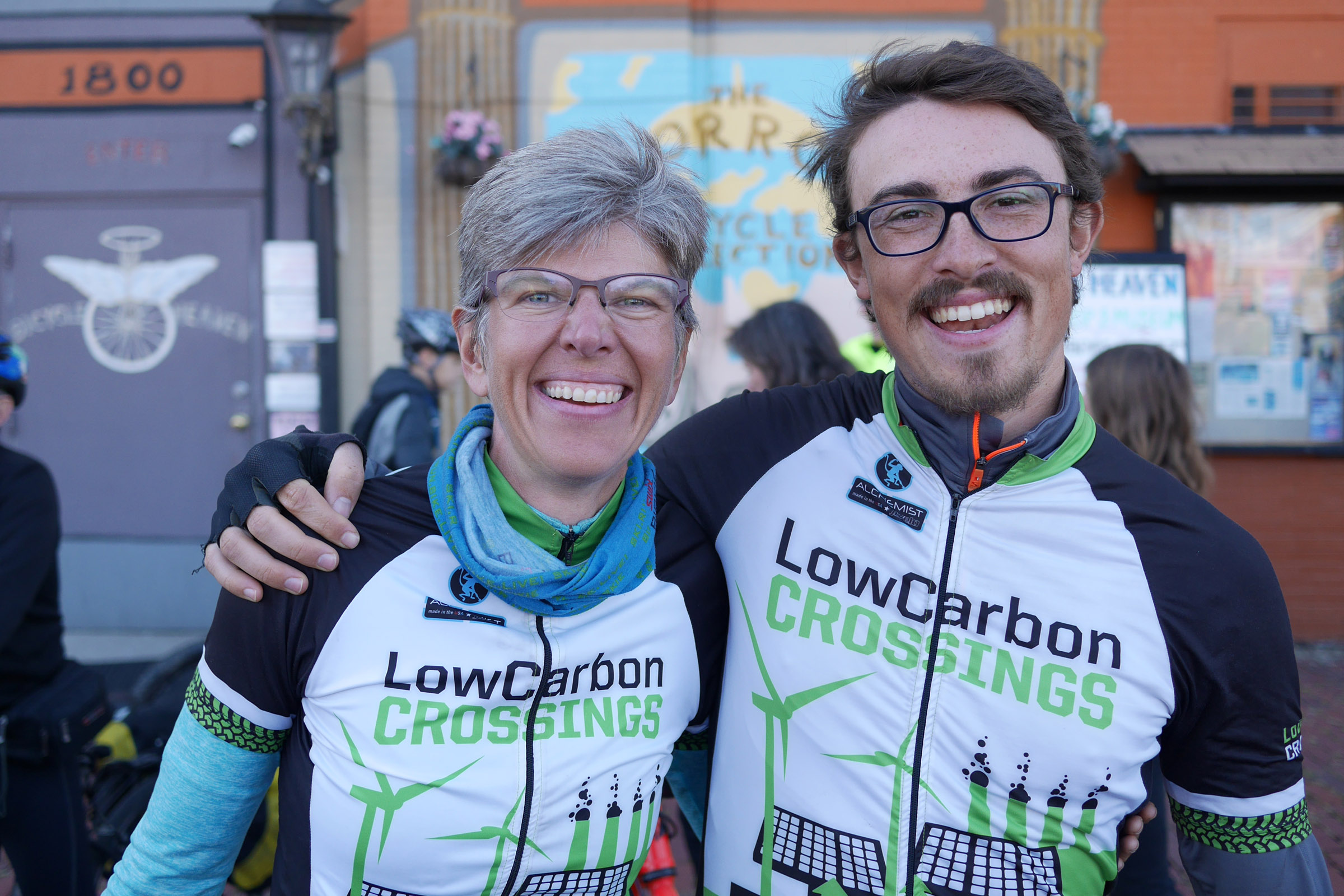It’s a sunny, unseasonably warm Sunday afternoon in November, and it’s giving cyclist Mindy Ahler mixed feelings.
“Yes, we can appreciate the individual day and celebrate that,” Ahler says. “But we do have to look at overall, this is a sign of how our climate is changing.”
LISTEN: Climate Activists Take Their Message Cross-Country
A handful of people have joined Ahler and her cycling companion, Ryan Hall, in the parking lot of the Bicycle Heaven museum and shop in Pittsburgh for a short “fun ride” in honor of their cross-country journey to draw attention to climate change. By this leg of the trip, Ahler says she thought they’d have encountered snow on one of their previous stops in Erie, Pennsylvania. Instead, it was 70 degrees.
In late August, Ahler and Hall began their trip on the Oregon coast. Now, more than 3,000 miles later, their LowCarbon Crossings tour is taking a break in Pittsburgh before heading down the Great Allegheny Passage and C&O Canal Towpath trails to finish their ride in Washington, D.C.
Ahler, who’s from Edina, Minnesota, just outside of Minneapolis, says she fell in love with long-distance cycling about 15 years ago. But this is the longest she’s pedaled. Still, she’s a veteran compared to Hall, a Detroit native. He’s brand new to cycling. Really—he just started training this summer.
“You know, my mentality is, if you want to do something, do it boldly,” he says. “I’ve been serving in AmeriCorps for the past three years, and my most recent service was around home energy efficiency. And this was a perfect transition to speak more about climate and energy on a nationwide scale, and to do that while on a bicycle, trying to inspire just little actions that make it accessible.”

Photo: Kara Holsopple
Hall and Ahler are both trim and dressed in matching green-and-white cycling jerseys, sporting drawings of solar panels and wind turbines. They’re also both smiling, though they’ve endured some of the hardships you might expect on a cross-country cycling trip: strong winds, blown tires and the occasional disgruntled motorist. At times, they’ve carried up to 70 pounds of gear when support vehicles or other cyclists haven’t been available to give them a boost. There’s even a solar panel and battery on the back of Ahler’s bike so they can recharge their phones and bike lights in a carbon-neutral way.
Ahler says she’s gained a lot of hope talking to people in each of the states they’ve traveled through. Not only have complete strangers been kind and generous with their time and resources, they’ve been open to talking about climate change and solutions—even if they’re not sure they even believe it’s happening or caused by human activities.
“We’ve had very cordial and friendly conversations,” Ahler says. “Sometimes it’s because they’re a biker. Some of them just think we’re crazy. But the conversation comes around to things like, ‘Well, yes, I’m concerned about my children and grandchildren.’ Or, ‘I respect the fact that you have a conviction that you would spend all this time biking across the country for.’”
Ahler says from what she’s seen and heard on this trip, people are hungry for civil conversation about topics that impact their lives, like climate change—especially after this tense political season.
“We’ve had very cordial and friendly conversations. Sometimes it’s because they’re a biker. Some of them just think we’re crazy. But the conversation comes around to things like, ‘Well, yes, I’m concerned about my children and grandchildren.’ Or, ‘I respect the fact that you have a conviction that you would spend all this time biking across the country for.’”
Back at home, Ahler is a regional coordinator for Citizens’ Climate Lobby, which is helping sponsor the road trip. So another message Ahler and Hall are spreading on the road is the group’s Carbon Fee and Dividend plan. The proposal is a $15-a-ton fee applied at the source where fossil fuels enter the economy. The fee on things like gas wells, coal mines or ports of entry would rise by $10 a ton each year. The revenue is refunded to individual households, and everyone gets an equal share. It isn’t based on how carbon-intensive your lifestyle is.
“That offsets the rising cost of everything,” Ahler says. “Because fossil fuels are built into everything that we buy and all of the things we use on a daily basis.”
She says the dividend is especially important for lower-income households because it keeps the carbon fee from being overly burdensome. The gradual carbon fee increase, she says, will help industry and businesses plan for the impact.
Ahler and Hall will roll into Washington, D.C. on November 13. On November 15, they and others from Citizens’ Climate Lobby will hold meetings with lawmakers to lobby for the plan. Ahler says she’s meeting with her own legislator and also bringing the stories she’s gathered from people in all of the states they’ve traveled through to their representatives.
Ahler says doing the legwork on a well-worn bike has been an effective way to get their low-carbon message across.
“I think it carries a little more weight than if I show up in a car. I don’t feel like it’s the same kind of commitment or the living of my values. If I’m showing up on a bicycle, that fits into that vision of what we want to create.”

